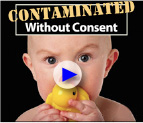Contact: Coming Clean, (802) 251-0203, info@comingcleaninc.org.
JULY 31, 2013
Toxic Chemical Reform: Senate Hearing Investigates How to Fix Broken Chemical Safety System
(Washington, DC) The Senate Environment and Public Works Committee convened a hearing today called “Strengthening Public Health Protections by Addressing Toxic Chemical Threats,” with panels of experts addressing the complex issues regarding toxic chemicals exposure.
“Senator Barbara Boxer has taken the lead on protecting our health from toxic chemicals and we thank her for convening this hearing,” said Nancy Buermeyer, senior policy strategist of Breast Cancer Fund, who is appearing as a witness at the hearing. “Congress must put limits on chemicals linked to skyrocketing rates of diseases like breast cancer. It is an urgent priority to pass chemical reform and it must be done right in a way that protects the health of the most vulnerable people.”
Alan Greene, MD, a practicing pediatrician, father of four and author of several top-selling books, described how children’s health is at risk from toxic chemical exposure during critical windows of development. “Babies are born with hundreds of toxic chemicals in their bodies that they were exposed to before even coming into the world. Protecting the health of our and most vulnerable members of society must be a first priority in reforming our out of date chemical policies.”
Cecil Corbin-Mark, WEACT for Environmental Justice, Harlem, and Environmental Health and Justice Alliance is a witness at the hearing. He explains: “Communities in Mossville, Louisiana, Texas, Alaska, Michigan, Delaware and many other places are suffering from chemical contamination every day with the air they breathe, the water they drink and the ground their children play on. TSCA reform must address ‘hot spots’ or, as we prefer to call them, ‘sacrifice zones’ where people can’t escape cancer causing chemicals in their environment.”
“Chemicals drift north on wind and water and our people have some of the highest levels of chemicals in our bodies bodies because of our reliance on traditional foods such as fish and marine mammals,” says Vi Waghiyi, of the Yupik people of St Lawrence Island and Alaska Community Action on Toxics. “TSCA reform must address those of us who are most harmed by exposures to toxic chemicals. Our people are suffering and dying..”
“Consumers are demanding safer products and transparency, and businesses owners along the global chemical supply chain, in every sector, need to know the properties of toxic chemicals and products marketed to them for their distribution.When the consumer finds out about toxic chemicals in their products, from the business perspective, retailers and manufacturers suffer while the multinational chemical companies remain largely unaccountable in the US,” stated Ally LaTourelle of BioEconomy Partners, a member of the American Sustainable Business Council.
“We need chemical regulations that support the laws in states that create safer environments for their people,” says Ana Mascareñas from Physicians for Social Responsibility - Los Angeles. “California, Washington, New York and other states have stepped forward to fulfill their sacred duty of protecting health, by passing chemical reforms that are missing at the federal level. Under the current Chemical Safety Improvement Act, states would lose that extra protection and that is unacceptable.”
“As nurses, we see patients and families every day who are impacted by chronic diseases and disabilities linked to toxic chemicals. This hearing is a positive move forward in protecting the health of all Americans as congress considers how to reform the outdated Toxic Substances Control Act," said Katie Huffling, RN, MS, CNM, director of programs at the Alliance of Nurses for Healthy Environments (ANHE).
“This hearing is a great beginning for the real discussion on how we can reform the Toxic Substance Control Act of 1976 to protect our health from toxic chemicals,” remarks Jamie McConnell from Women’s Voices for the Earth.
For more information:
Coming Clean’s Louisville Charter for Safer Chemicals
Sinister Partners: Transatlantic Trade Agreement & Toxic Chemicals, Friends of the Earth
For media assistance:
Stacy Malkan, 501 848.5701 stacydmalkan@gmail.com
Available for Interviews:
Cecil Corbin-Mark, WEACT for Environmental Justice, Harlem, and member of the Environmental Justice and Health Alliance, Cecil@weact.org 917 501.4980. Cecil can address TSCA reform efforts, the disproportionate impacts on people of color - “hot spots” and “sacrifice zones” - and is a witness at today’s hearing.
Nancy Buermeyer, senior policy strategist, Breast Cancer Fund, and witness at today’s hearing. To schedule an interview with Nancy please contact Margie Kelly, nyc.margie@gmail.com. 54 .222.9699, or Shannon Coughlin, scoughlin@breastcancerfund.org, 415 336.2246.
Janet Nudelman, director of program and policy for the Breast Cancer Fund. To schedule an interview with Janet Nudelman, please contact Margie Kelly, nyc.margie@gmail.com. 541 222.9699, or Shannon Coughlin, 415 336.2246, or scoughlin@breastcancerfund.org
Anjse Miller, eastern states director, Center for Environmental Health and and witness at today’s hearing. Ansje can address TSCA reform and states rights to strong environmental health protections, and is a witness at today’s hearing. To schedule an interview with Ansje, contact Charles Margulis, charles@ceh.org, 510 697-0615.
Ana Mascareñas, policy & communications coordinator, Physicians for Social Responsibility - Los Angeles (PSR-LA), amascarenas@psr-la.org, 213 689.9170. Ana can address health impacts from chemicals and how TSCA reform needs to protect the rights of physicians, nurses and other health care providers to disclose information about health impacts linked to chemicals.
Elizabeth Crowe, executive director, Kentucky Environmental Foundation. elizabeth@ kyenvironmentalfoundation.org or call 859 986.0868./ Rlizabeth can address chemicals impacts in Kentucky and other Southern areas.
Pamela K. Miller, executive director, Alaska Community Action on Toxics (ACAT) pamela@akaction.org, 907 222.7714. Pam can address toxic chemical contamination in the Arctic and efforts at the United Nations with international treaty to halt toxic chemical exposure on a global level.
Vi Waghiyi, Yupik people, St. Lawrence Island, Alaska, and Alaska Community Action on Toxics, vi@akaction.net, 907 222.7714 or 907 444.9194, on how the Arctic is a “toxic sink” for persistent chemicals drifting north on wind and water and being in higher concentrations in humans and wildlife there, and how important it is to protect the Arctic region from toxic chemicals in TSCA reform.
Martha Dina Argüello, executive director, Physicians for Social Responsibility – Los Angeles (PSR-LA) 213 689-9170, ext. 101, marguello@psr-la.org. Martha can address health impacts from chemicals and how TSCA reform needs to protect the rights of physicians, nurses and other healthcare providers to disclose information about health impacts linked to chemicals.
Michele Roberts, Environmental Justice and Health Alliance robertsmichele7@gmail.com 202 704.7593. Michele can address disproportionate impacts on communities of color from chemicals and how TSCA reform needs to urgently halt harm in the most hazardous exposure areas - also referred to as “hot spots” or “sacrifice zones” in Louisiana, Texas, Delaware, Alaska, Detroit, Richmond, CA, and other areas.
Richard Moore, Environmental Justice and Health Alliance - Los Jardines Institute (The Gardens Institute), Albuquerque, New Mexico ljinewmexico@gmail.com 505 301.0276. Richard can address disproportionate impacts of chemicals on people of color and workers, and how TSCA reform must address these populations.
Kathy Curtis, executive director, Clean & Healthy New York and Co-Chair, Alliance of Nurses for Healthy Environments Policy/Advocacy Work Group, clean.kathy@gmail.com, 518 708.3922 (cell), 518 355.6202 (home office), www.cleanhealthyny.org. Kathy can address efforts in New York state the importance of states to be able to have their own strong chemicals policies and can talk about national work to reform TSCA.
David Levine, co-founder, American Sustainable Business Council, dlevine@asbcouncil.org, 917 359-9623 David can address how environmental health protections in TSCA reform helps restore consumer confidence, spur innovation and is pushing economic growth, particularly among small businesses.
Jamie McConnell, director of programs and policy, Women's Voices for the Earth, jamiem@womensvoices.org, 406 543.3747. Jamie can address how regulatory failure has contributed to toxic chemicals in products we use every day, and what needs to be in TSCA reform to keep dangerous chemicals out of the marketplace.
Kathryn Alcántar campaign director, Californians for a Healthy & Green Economy (CHANGE), www.changecalifornia.org Kathryn@ceh.org 510 655.3900, x315 Cell: 415 694.9596. Kathryn can address states' rights, "hot spots," TSCA impacts on workers,and and ser entrevistados en español.
# # #




